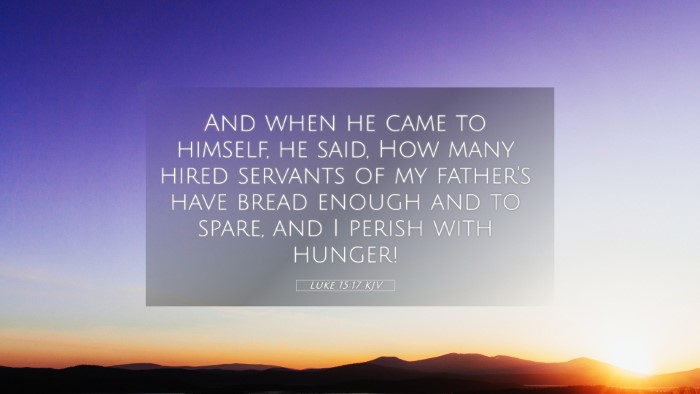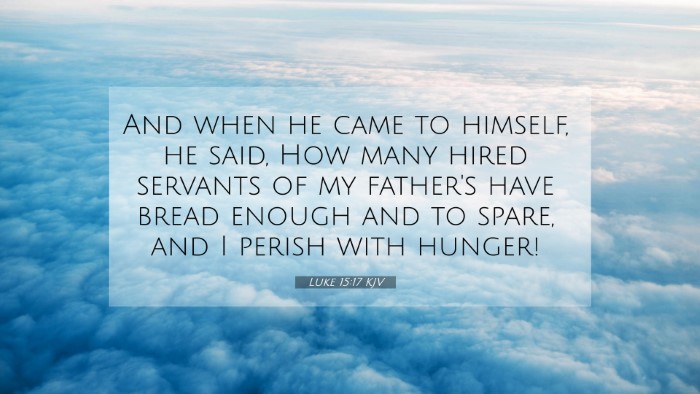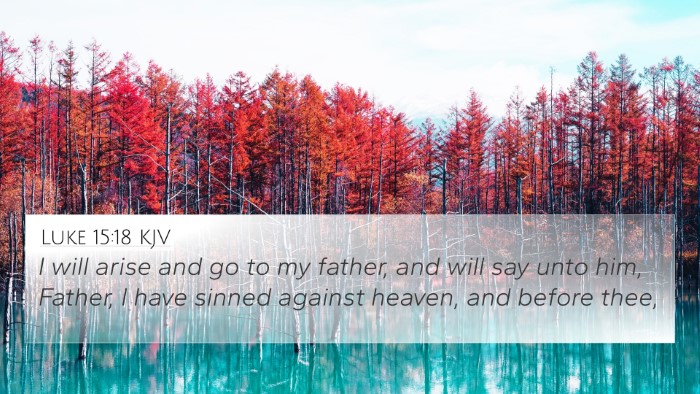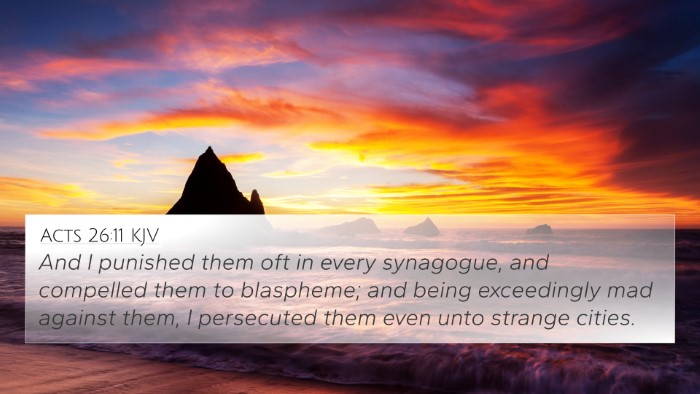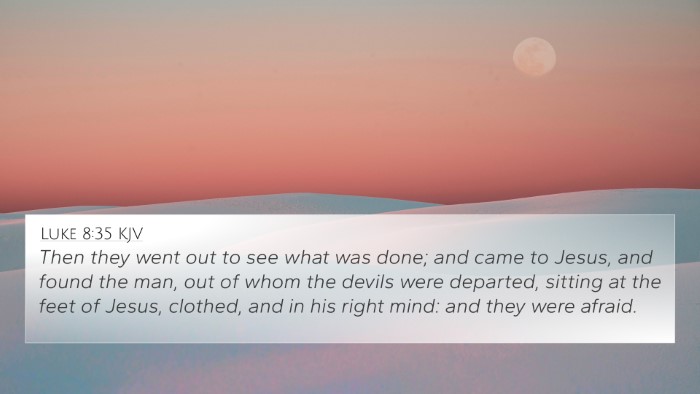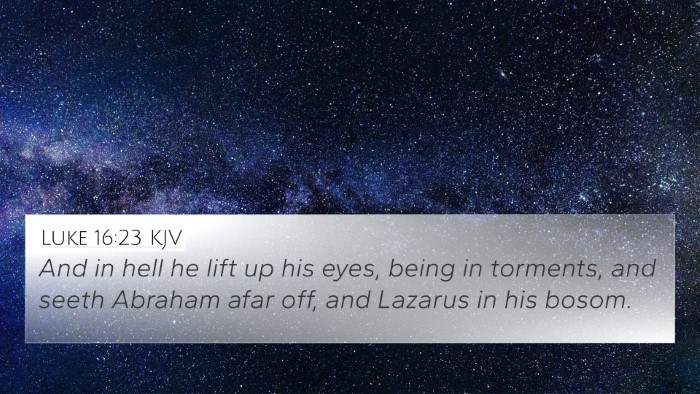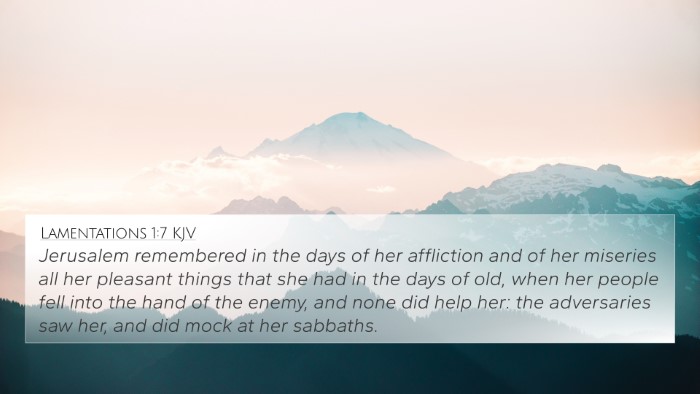Understanding Luke 15:17
Luke 15:17 states, “But when he came to himself, he said, ‘How many of my father’s hired servants have food enough and to spare, but I perish with hunger!’” This verse is central to the parable of the Prodigal Son, illustrating the moment of realization and repentance of the wayward son.
Commentary Insights
This moment of coming to oneself signifies a deep awareness of one’s condition. According to Matthew Henry, this reflects the internal struggle and awakening of the heart. The son realizes that he is not living in accordance with his identity and inheritance, which leads him to contemplate a return to his father.
Albert Barnes elaborates on the implications of this verse, emphasizing how the young man's physical and spiritual hunger prompts self-reflection. The comparison of his dire situation to the abundance experienced by his father's servants illustrates the depth of his despair and the extent to which he has fallen.
Adam Clarke highlights the son's recognition of the mercy and provision that exist within his father's household. This awareness not only catalyzes his decision to return but also invites readers to reflect on the nature of God’s grace, showing that even those who stray far can find redemption and sustenance in the Father’s love.
Bible Verse Cross-References
- Proverbs 14:14 - “The backslider in heart will be filled with his own ways, but a good man will be satisfied from above.”
- Psalm 119:67 - “Before I was afflicted I went astray, but now I keep Your word.”
- Matthew 11:28 - “Come to Me, all you who labor and are heavy laden, and I will give you rest.”
- Isaiah 55:1 - “Ho! Everyone who thirsts, come to the waters; and you who have no money, come, buy and eat.”
- John 6:35 - “And Jesus said to them, ‘I am the bread of life. He who comes to Me shall never hunger, and he who believes in Me shall never thirst.’”
- Luke 15:18 - “I will arise and go to my father, and will say to him, ‘Father, I have sinned against heaven and before you.’”
- 1 John 1:9 - “If we confess our sins, he is faithful and just to forgive us our sins and to cleanse us from all unrighteousness.”
Thematic Connections
The themes of repentance, grace, and forgiveness weave throughout the entire Bible, and Luke 15:17 serves as a pivotal point that connects various teachings about return and restoration. The realization of the Prodigal Son echoes the sentiments found in other scriptural passages discussing the mercy of God.
Linking Bible Scriptures
This verse serves as a bridge for understanding similar themes presented across different books of the Bible:
- Luke 19:10 - “For the Son of Man has come to seek and to save that which was lost.”
- Romans 5:8 - “But God demonstrates His own love toward us, in that while we were still sinners, Christ died for us.”
- James 4:8 - “Draw near to God and He will draw near to you.”
Comparative Bible Verse Analysis
The Prodigal Son's experience is not isolated, but it resonates with the broader narrative of human fallibility and divine redemption. Readers can engage in cross-referencing Biblical texts to gain a deeper understanding of the implications of this moment:
- Examining how the Old Testament prophets foreshadow themes of return and restoration (e.g., Joel 2:12-13).
- Comparisons with New Testament teachings on lostness and grace such as the stories of lost sheep and coins in Luke 15:4-10.
Tools for Bible Cross-Referencing
For readers interested in exploring these connections further, several tools and methods can assist in effective Bible study:
- Bible Concordance - A great resource for finding specific words and related verses.
- Cross-Reference Bible Study - Techniques for linking verses that share themes or narratives.
- Bible Chain References - Following a trail of verses connected by shared themes or teachings.
- Bible Cross-Reference Guide - Helpful for seeing how different scriptures relate to each other.
Final Thoughts
Luke 15:17 is not just a moment of introspection for the Prodigal Son; it serves as an invitation for all readers to acknowledge their own spiritual condition and to seek the grace that is abundantly available in the Father’s house. This verse encourages deeper engagement with scriptural text through cross-referencing Biblical texts and recognizing thematic Bible verse connections that provide insight into God's overarching mercy and love.

